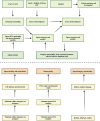Determinant genetic markers of semen quality in livestock
- PMID: 39429738
- PMCID: PMC11489916
- DOI: 10.3389/fendo.2024.1456305
Determinant genetic markers of semen quality in livestock
Abstract
The reproductive efficiency of livestock is crucial for agricultural productivity and economic sustainability. One critical factor in successful fertilization and the viability of offspring is the quality of semen. Poor semen quality, especially in frozen-thawed semen used in artificial insemination (AI) have been shown to influence conception outcomes, resulting a negative impact on livestock production. Recent advancements in genetic research have identified specific markers linked to semen quality traits in various livestock species, such as cattle, sheep, goats, pigs, buffalo, and equines. These genetic markers are essential in screening males for breeding suitability, which in turn enhances selective breeding programs. Understanding these markers is crucial for improving reproductive performance and increasing productivity in livestock populations. This review offers a comprehensive overview of the genetic markers associated with semen quality in key livestock. It explores the underlying genetic mechanisms and their practical implications in animal breeding and management. The review underscores the importance of integrating genetic insights into breeding strategies to optimize reproductive efficiency and ensure the sustainable development of livestock industries.
Keywords: genetic markers; livestock; reproductive efficiency; selective breeding; semen quality traits.
Copyright © 2024 Khan, Chen, Naz, Liu, Liang, Chen, Kou, Liu, Ashraf, Han, Peng, Wang and Zahoor.
Conflict of interest statement
The authors declare that the research was conducted in the absence of any commercial or financial relationships that could be construed as a potential conflict of interest.
Figures

References
Publication types
MeSH terms
Substances
LinkOut - more resources
Full Text Sources

